'Dutch companies support agricultural innovation in South Africa'
The collaboration between the Netherlands and South Africa on innovations in the agricultural sector is of significant importance. A good example is the current development of the Hortipreneurial Centre of Excellence at the Stellenbosch University, claims agricultural advisor Bernard Likalimba from the Netherlands embassy in Pretoria. This article is part of a series on the agricultural advisors who play an important role in the Netherlands Agricultural Network (LAN) worldwide.
The South African agricultural sector has two faces: big, well organised companies beside many small-scale farmers. The national policy puts strong emphasis on strengthening the small, emerging farmers. “What they need is user friendly, affordable equipment and knowledge. Dutch companies can provide many agricultural techniques and expertise. The challenge is to integrate them in the agricultural market of South Africa”, says Likalimba.
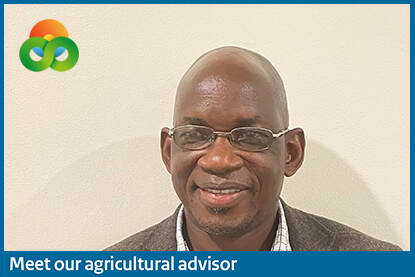
The agricultural advisor, who lives and works mostly in Pretoria, was raised in a catholic family in Malawi. As a youngster, Likalimba believed he would become a priest. After high school he was recruited by a Roman Catholic organisation to study theology at the University in Natal. Eventually, Likalimba took a different turn and became a social scientist. “During my theology studies, I took sociology courses as well. In my upbringing, social and political commitment were important, and I decided to do a master’s in the social sciences. I currently hold a PhD in Sociology”.
For about 16 years, Likalimba worked in organisational and programme development and monitoring, and in evaluation of social and economic development projects in the non-profit and donor sectors. He managed and participated in projects in more than twenty countries in and outside Africa. Agricultural development was one of the fields he worked in.
Why did you transfer to the agricultural team?
I was advised in 2016 to apply for this position for the agricultural department at the Netherlands embassy in Pretoria. For me, it was an opportunity to start working on the trade side of social issues. Agriculture is of immense importance in the social-economic development of the country, and in this position I could contribute.
My strong points are my great network in the agricultural working field in many Southern African countries. I worked in many projects and know how to organise projects, events and collaborations. I am also able to analyse both the social and the business context in the agricultural world. Without understanding that, it is hard for Dutch companies to form successful collaborations.”
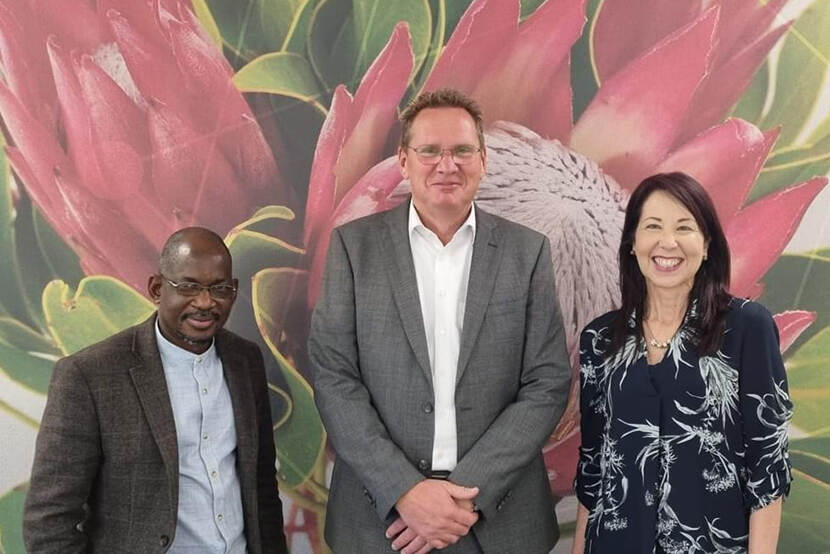
Keeping in shape
The agricultural team in Pretoria consists of Niek Bosmans (agricultural counsellor), Bernard Likalimba (agricultural advisor) and Dalene Breytenbach (management assistant).
Likalimba lives about 15 km from the embassy in Pretoria, with his wife and three children. He is an early bird, leaving home at 06:00 hours to avoid the massive daily traffic jams. He spends his spare time with his family. “Every two days, I go to the gym to stay in shape and to relieve my work stress. I am a church person, so I teach at the Sunday school, and I am a member of the peace and justice committee in my church. I travelled a lot for my jobs. If I had the time and the money, I want to take my family to my home country of Malawi and other interesting countries.”
'In the long run, grain import from Ukraine may pose a problem. We have three to four months in storage, but this new growing season is very insecure, which is already reflected in increasing grain prices'
What are your tasks as agricultural advisor?
“First of all, I support the implementation of the Dutch International Sustainable Agricultural Strategy based on annual plans. That means implementation of bilateral projects and programmes, helping Dutch companies with market access and with import and export issues. I also conduct and facilitate research on local economic issues; I advise Dutch companies on South African trade policy issues, and I function as a liaison between the embassy and key stakeholders in South Africa and other parts of the South African Development Community region, that consists of 16 countries.”
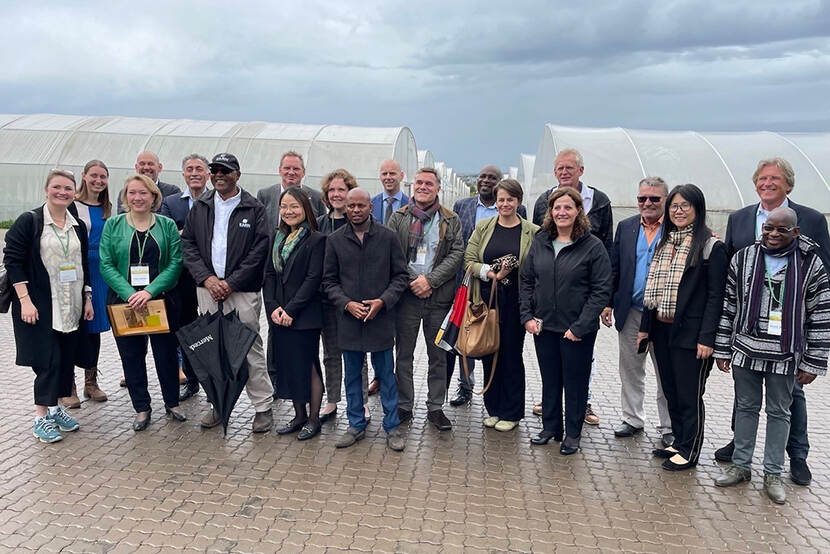
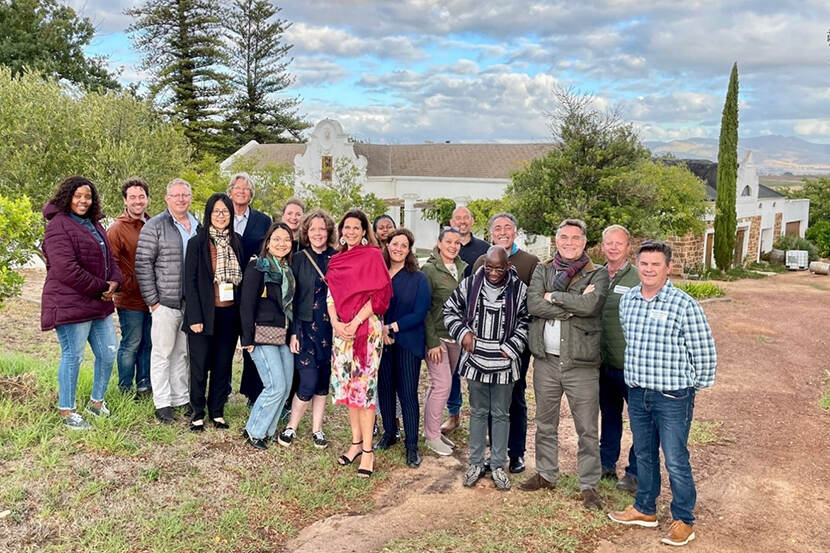
Innovation mission visited two South African provinces
Between April 4 - 8 2022, a delegation of 12 people representing 10 Dutch companies and knowledge institutes visited South Africa as part of the innovation mission on Climate Smart & Sustainable Agriculture. The delegation was a well-balanced group of organizations with each bringing its own expertise, technologies and solutions in the agricultural value chain. This included research, training and education, vegetable seeds, remote sensing, water and soil monitoring, crop advice, organic fertilizers and biological solutions. They visited two South African provinces, Limpopo and Western Cape, and met with top South Africa fruit producers and policy makers.
If you are interested in the results of this mission, or in case of further questions, please contact Bernard Likalimba, email: makhaliha.likalimba@minbuza.nl
What are the main challenges?
“For the big commercial farms, it is logistics. How can they bring their products to the export markets? The Netherlands is the largest importer of South African fruit (mainly citrus, apples, avocados and table grapes) and has an interest in improving the efficiency of the agro-logistic system. A Dutch consortium is working on that together with South African stakeholders in the 'Cool Train'-project. Central to this is the development of cold containerized transport. This should lead to a significant reduction of logistics costs and post-harvest losses. A consolidation centre should bring opportunities for smaller farmers to link up with this logistics system. Market access is important for small businesses too, as well as improving production and business skills and reducing post-harvest losses. Other challenges including: cost of inputs and unreliable electricity supply in South Africa”.
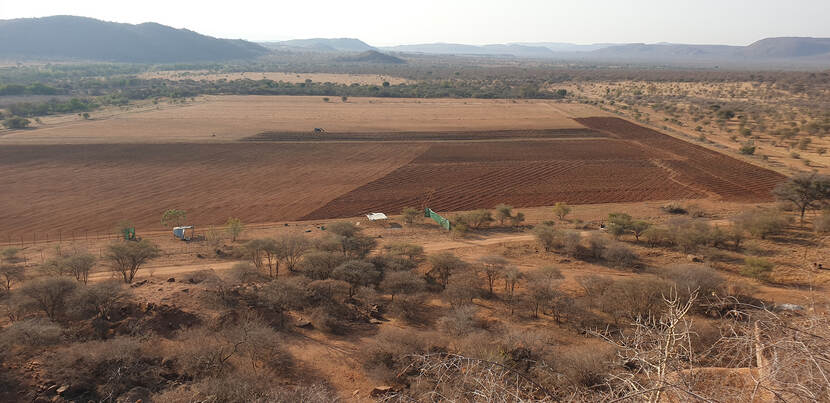
What was the influence of COVID-19 pandemic on South Africa?
“Many people lost their jobs because of the lockdowns. People who can afford it, consume more healthy foods such as lemons and ginger. People in the country and in the townships just need to get food on the table.
A positive effect of the pandemic is that working from home is demystified. Many governmental officials started working from home, as did I. That turned out to be possible, but I am glad I can go to the office again since the beginning of this year.”
Ukraine is far away from South Africa, but does the war have effects on your country?
“Everybody is talking about this war, even people in the townships who do not follow the news. The oil and fuel prices rapidly increased. Russia and Ukraine are important trade partners, especially for fruits. About 14% of our fruit exports go to Russia, and 7% goes to Ukraine. These exports have stopped. It takes time to find alternative markets, in Africa as well. In the long run, grain import from Ukraine may pose a problem. We have three to four months in storage, but this new growing season is very insecure, which is already reflected in increasing grain prices .”
What is the national policy on sustainability and climate resilience?
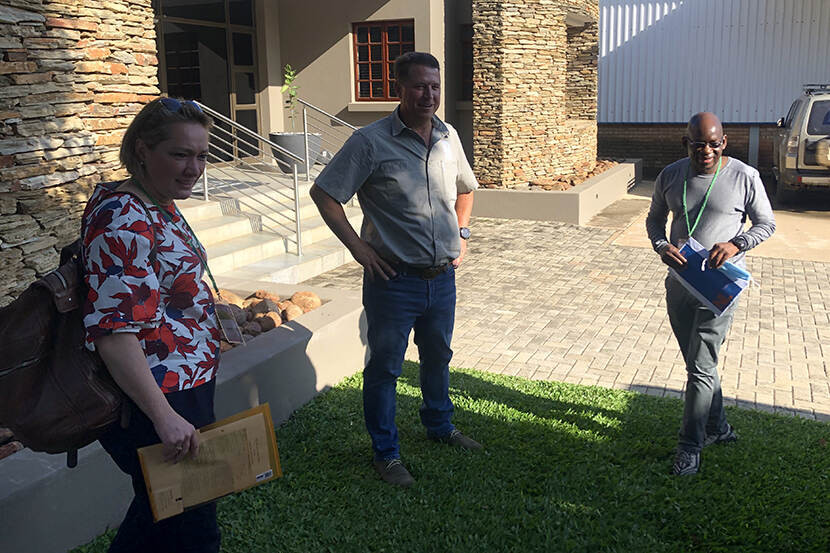
“There is a strong interest in these issues. Parts of the country suffered from very severe drought in 2015-2016 and 2017-2018. The policy is to take action on different levels. Water management, harvesting and water storage are important. Another measure is changing and varying crops that are less vulnerable to drought. Advanced techniques can be implemented for precision agriculture. Large scale farmers are interested, but the costs are a problem.
With regard to sustainability, it is important to know that in parts of South Africa people have limited access to food due to poverty. Sustainable measures in agriculture mean higher costs and more expensive food. The big commercial farms are dominant in the market, so they should take the lead. They are working on things such as biological pest control and reducing the use of pesticides, but there are also cost issues.”
What are important focus points for the coming years?
“The collaboration between the Netherlands and South Africa on innovations in the agricultural sector is of the utmost importance. A good example is the current development of the Hortipreneurial Centre of Excellence at the Stellenbosch University. Our agricultural team mobilised Delphy to coordinate this development. On the university grounds a greenhouse is to be built for demonstration, education, and training activities for farmers, young 'agripreneurs' and students. Stellenbosch University, Greener Solutions, Ridder Group, Ludvig Svensson, RijkZwaan, Koppert Biological Control, Control Union and Delphy work together in this partnership.
From this centre, farmers will receive guidance to increase their production, and to make it more sustainable. That is important, because climate change hits the South African agricultural productivity and food security due to the increase of extreme draught and rainfall. During cultivation in the greenhouse, careful use of water, fertilisers, crop protection agents and energy is crucial. Besides this unemployment is very high. The agricultural sector could absorb much of this labour force.”
‘Agriculture is of immense importance in the social-economic development of the country, and in this position, I can contribute’
Energy Transition
“Other areas of collaboration is Just Energy Transition, in which Dutch companies are being mobilised to collaborate with local stakeholders in repurposing electricity power stations running on coal; and agro-logistics aimed at, among other things, limiting greenhouse emissions, reducing post-harvest losses, reducing plant health risks and supporting market access for emerging farmers.”
Contact
E-mail: pre-lnv@minbuza.nl
Phone: +27 12 4254570
Twitter: @Agri_NLinSA